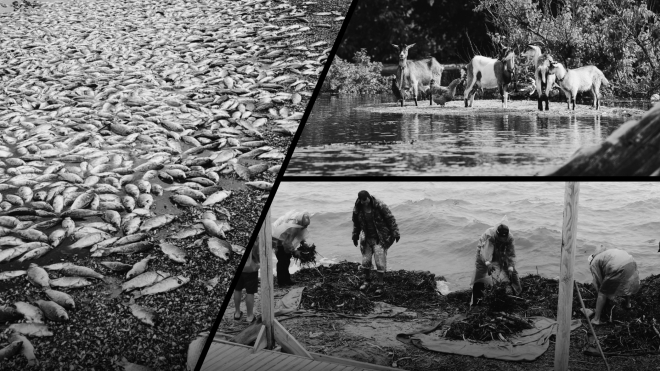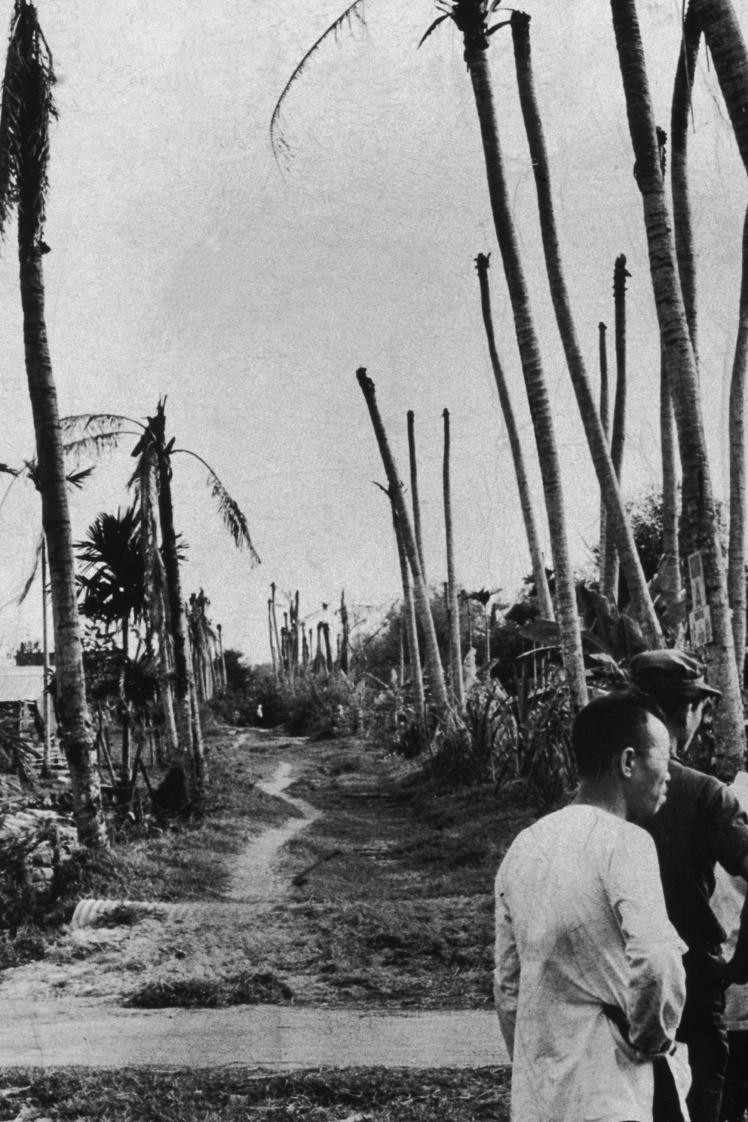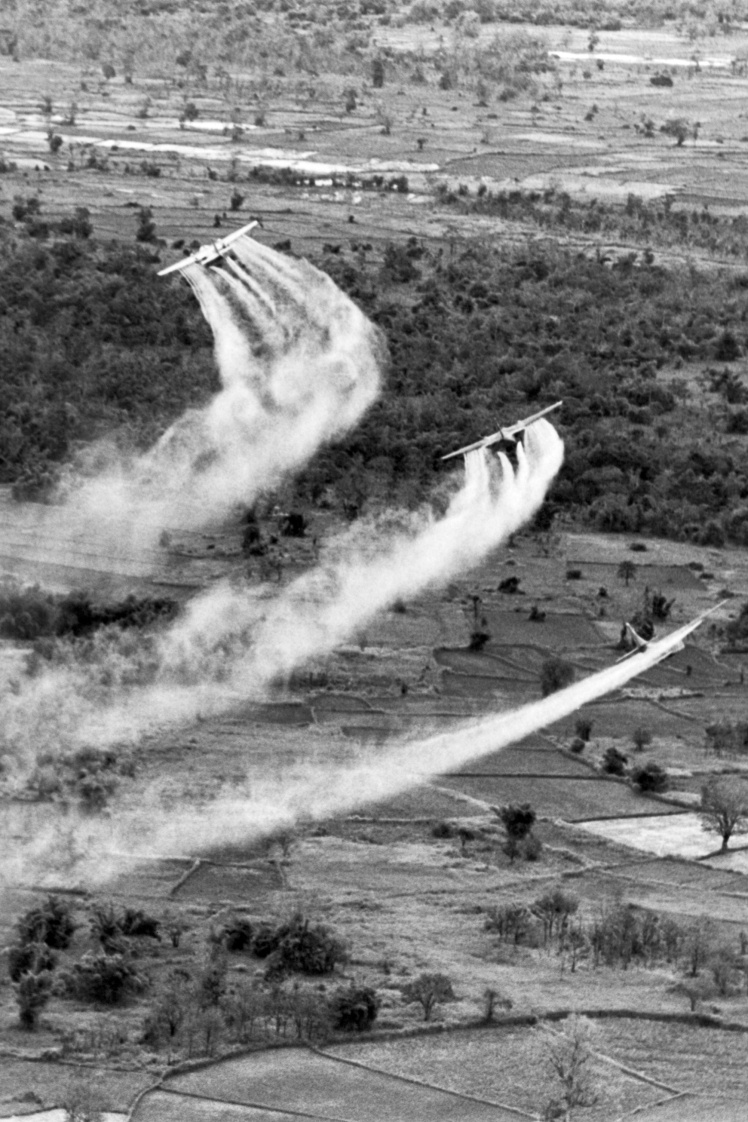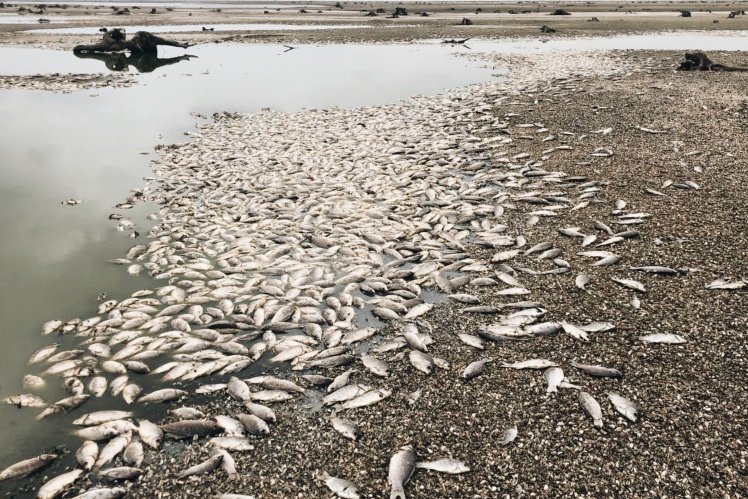What is ecocide and its first examples
For the sake of winning wars, people have been destroying nature since ancient times. In the IV century BC one of the "seven wise men" of Ancient Greece, Solon, during the siege of the city of Kirra, poisoned the river and left the opponents without water. During the First World War, German troops actively used chemical weapons — they killed not only soldiers, but also the environment. During the Second World War, the same Germans took chernozem (soil famous for its fertility) from Ukraine by train.
The very term "ecocide" arose during the war in Vietnam. At that time, the Vietnamese military effectively used the jungle to camouflage their camps and routes. This became a problem for the Americans, who were conducting reconnaissance from the air. So they used herbicides to destroy millions of hectares of forest.
This is what palm trees destroyed by herbicides looked like. US Air Force planes spray herbicides and chemicals that are harmless to humans and animals but poisonous to plants (1966).
Getty Images / «Babel'»
The Americans also conducted Operation Popeye in Vietnam. They sprayed silver iodide in the clouds, artificially creating rain on the Vietnamese routes to slow their movement. As a result, almost half of the arable land became unsuitable for agriculture, 2 million hectares of forests and 70% of biological species disappeared. Toxic substances still remain in the soil, especially near former US air bases.
In 1970, American bioethicist Arthur Galston proposed the term "ecocide". And in 1972, this word was heard for the first time in the UN — in the speech of the Prime Minister of Sweden, Olof Palme, about the consequences of the war in Vietnam.
How this crime is classified in the world
There is no such term in international criminal law yet. However, some international lawyers, including Philip Sands, are actively working to make ecocide an international crime.
In Ukrainian legislation, such a term is "mass destruction of plant or animal life, poisoning of the atmosphere or water resources, and other actions that can lead to an ecological disaster." Likewise, ecocide is considered a crime in most of the former Soviet republics, in France, Ecuador, and Vietnam. There was no such article in the Criminal Code of the USSR, but Natalia Handel notes that post-Soviet countries were affected by the Chornobyl disaster, which is why ecocide appeared in their criminal codes.
What cases of ecocide is Ukraine investigating
According to Maksym Popov, adviser to the Prosecutor General of Ukraine, the Specialized Environmental Prosecutorʼs Office currently has 14 such criminal cases against Russians. They can be divided into four groups.
Attacks on oil storage facilities. This refers to all the consequences of Russian missiles hitting oil depots — polluted air, groundwater, lakes and rivers. According to Popov, in order to clean the earth from harmful substances, it is sometimes necessary to remove layers of soil.
Death of dolphins. In the spring and summer of 2022, up to 5 thousand dolphins died in the Tuzla estuaries alone. In the fall of 2022, experts conducted autopsies, took samples of the dolphinsʼ brains and inner ears, and sent them to Italy and Germany for research. There are still no results (usually such examinations take a long time) but scientists believe that the dolphins died because of the radar systems of Russian submarines. Their sonars and blasts cause dolphins to go deaf, die from acoustic trauma, and wash ashore.
Threat to nuclear energy facilities. This refers to the previously occupied and liberated Chornobyl NPP, and Zaporizhzhia NPP, which is still under Russian control. According to Popov, in such serious cases, responsibility for ecocide can arise even when there are no consequences for the environment yet, but the actions can already lead to an ecological disaster. "This is exactly what the aggressor country is doing with nuclear energy facilities, and we qualify it as ecocide," explains Popov.
Another thing is the shelling by the Russians of the Institute of Nuclear Research in Kharkiv. Nuclear material for research is stored there in the repository. The territory of the institute was shelled by the Russians about a hundred times, but the storage wasnʼt hit.
Destroying the Kakhovka HPP. The Prosecutor Generalʼs Office opened a case not only for ecocide, but also for violation of the laws of war — the Geneva Conventions prohibit attacks on dams and nuclear power plants, even if they are military facilities.
People collect the remains of buildings and other garbage that the current brought to the Odesa coast after Russian troops blew up the Kakhovka HPP. Remains of fish that died due to a drop in the water level in the Kakhovka Reservoir after the dam was blown up.
Getty Images / «Babel'»; Держрибагентство / Facebook / «Бабель»
Who can be tried for ecocide and who will do it
Ukraine can prosecute the direct destroyers of the Kakhova HPP and the people who launched rockets at oil depots. For this, law enforcement officers need to collect evidence and identify the perpetrators. Ideally, the suspects should be arrested, but such processes can also be held in absentia.
The International Criminal Court cannot investigate ecocide, but it has other possibilities. Now there is a movement of international lawyers who are trying to add ecocide to the Rome Statute as a fifth international crime — so far without success. However, the statute mentions damage to the natural environment in the context of war crimes. Therefore, the International Criminal Court may consider the undermining of the Kakhovka HPP a war crime.
The Ukrainian Office of the Prosecutor General followed this path. A few days after the destroying of the HPP, Prosecutor General Andriy Kostin, together with representatives of the Prosecutorʼs Office of the International Criminal Court, went to the site of the disaster.
On June 11, 2023, Prosecutor General of Ukraine Andriy Kostin and employees of the International Criminal Court visit the flooded Antonivka and Kherson.
Андрій Костін / Facebook / «Бабель»
"Ukraine, represented by the Prosecutor Generalʼs Office, is open and ready to provide access to the scene of the incident to representatives of the International Criminal Court, to provide evidence that we will collect as part of our national investigation," says Popov. Whether the ICC will start an investigation will become clear later.
Can Ukraine appeal to the International Court of Justice of the United Nations
According to Natalia Handel, there are several cases when it can be done. The first is if the states have agreed that in case of disputes, they will be "conciliated" by the UN court. For example, as was the case in the dispute between Ukraine and Romania regarding the delimitation of the continental shelf. The UN Court, to which both countries appealed, then found a compromise. This time, such a scenario is unlikely due to the position of the Russians.
Another option is when the states did not conclude treaties on this matter among themselves, but signed the same international convention, which provides that disputes will be considered in a specific court or arbitration. There are several conventions in the field of ecology, which have been ratified by both Russia and Ukraine, and disputes regarding them should be considered by the UN International Court of Justice. That is, Ukraine can go to court because Russia has violated its obligations. Ukraine is already following this path in the UN International Court of Justice, where it is proving Russiaʼs violation of two conventions not related to ecology — on the fight against the financing of terrorism and on the elimination of all forms of racial discrimination, and also has a dispute with Russia regarding the Convention on the Prevention of Genocide.
The third case — Ukraine can initiate a request of an international organization or the UN General Assembly to the International Court of Justice of the UN with a request to provide an advisory opinion on the norms of the convention. But this will not be a substantive trial, only an official interpretation that can be used later to hold Russia accountable.
Have international courts dealt with such crimes before?
Similar crimes have not yet been investigated by the International Criminal Court. But they have already touched on ecology in the context of war crimes. This refers to the case of the former president of Sudan Omar al-Bashir, who is being tried for genocide in Darfur. One of the accusations against him is that his soldiers deliberately polluted wells and water pumps, which were the only sources of water for the people of Darfur.
Former Sudanese President Omar al-Bashir in court in Khartoum. He was tried there in 2020 for the 1989 military coup that brought him to power.
Getty Images / «Babel'»
The UN International Court of Justice has precedents for environmental conflicts between states. In 2010, Costa Rica and Nicaragua quarreled over a common border along the San Juan River. The UN International Court of Justice recognized that Nicaragua, which wanted to build a canal on the river, violated the sovereignty of Costa Rica and must compensate for material damages. Although the compensation turned out to be small — $379 thousand was paid while Costa Rica demanded $6.7 million.
There was still a case in the UN court about the dispute between the Democratic Republic of Congo and Uganda. It related to war and occupation. During the Second Congo War, Uganda occupied the eastern regions of the Congo. In 2022, the International Court of Justice of the United Nations ordered Uganda to pay $325 million in compensation, of which $60 million is for damage caused to natural resources. It was said that Uganda was fully responsible for the captured territories. This rule also applies to Russia as an occupying country.
Are there any other courts where Ukraine can go?
Yes. For example, the European Court of Human Rights. Since autumn of 2022, there is a lawsuit "Ukrhydroenergo against Russia". Ukraine demands compensation for damages for the destroyed hydrotechnical infrastructure. After blowing up the Kakhovka HPP, Ukrhydroenergo informed the ECHR about it and asked to consider the claim as soon as possible, before the Russians blew up something else.
Animals near a flooded housing estate in the Russian-occupied town of Hola Prystan, Kherson region, on June 8, 2023.
Getty Images / «Babel'»
Translated from Ukrainian by Anton Semyzhenko.
Crimes of ecocide are investigated for a long time, because evidence and expertise are needed. So that we can monitor the development of events all this time, support Babel: in hryvnia, 🔸 in cryptocurrency, 🔸 Patreon, 🔸 PayPal: [email protected]



